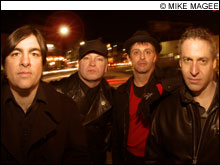 Is this any way to make a comeback? It’s Friday night at the Abbey, and the Prime Movers are playing the headlining set. But they’re not plugging their forthcoming CD. They’re not even playing most of the songs that drove their sets two decades ago. Instead they’re having fun blasting through covers. Before it’s over, they’ve nailed the Creation (“Makin’ Time”), the Byrds (“So You Wanna Be a Rock ’n’ Roll Star”), and Little Richard (“The Girl Can’t Help It,” as Rockpile would’ve played it). Their own nugget “Come to Where It’s At” fits well in this company. Indeed, one local musician who doesn’t recognize all the tunes leans over to me and notes, “You’ve gotta love these guys. They really have the songs.”
Is this any way to make a comeback? It’s Friday night at the Abbey, and the Prime Movers are playing the headlining set. But they’re not plugging their forthcoming CD. They’re not even playing most of the songs that drove their sets two decades ago. Instead they’re having fun blasting through covers. Before it’s over, they’ve nailed the Creation (“Makin’ Time”), the Byrds (“So You Wanna Be a Rock ’n’ Roll Star”), and Little Richard (“The Girl Can’t Help It,” as Rockpile would’ve played it). Their own nugget “Come to Where It’s At” fits well in this company. Indeed, one local musician who doesn’t recognize all the tunes leans over to me and notes, “You’ve gotta love these guys. They really have the songs.”
You’d expect a reunited mid-’80s band to be a little jaded, or at least to look a little older than these guys do. But singer Cam Ackland’s still got his mod swagger, guitarist Dick Tate and drummer Dennis McCarthy still play like kids on a rampage, and bassist Jeff Sugarman, in the best Kinks/Who tradition, remains the quiet one. The Movers are living proof you can’t go out of style when you’ve never really been in. This is the one band who often get slighted when the roll call of great ’80s garage bands is brought up. Songs like “Matter of Time” and “True to Me” have faded from the memory banks, even though they were all over local radio in the mid ’80s. So it’s a safe bet that a lot of the people seeing the reunited Prime Movers don’t even know it’s a reunion. They just know it has a great beat and you can dance to it.

Over beers at the Abbey, where the band headline this Friday, February 24, with Barrence Whitfield, the four Movers ponder what it means to be back. “Subconsciously or not, we’ve never used the word reunion,” Tate notes. “That would make it sound like it’s a one-shot deal, where this just feels like we’re getting back together. In a way it’s a blessing that we don’t have that much to live up to — we didn’t release much material, so we’re a fairly unknown entity. We can just have some fun and keep our scope of vision fairly humble.”
All four original members are back, though without the couple of keyboard players they added and subtracted over the years. (“Anything’s better than having to carry that B-3 around,” Tate offers.) “It sounds pretty trite to say this, but it really does feel better this time,” Ackland adds. “I really like playing for younger people who might not have seen us before.” As McCarthy puts it, “We formed this band in high school, and there are some things you just can’t get out of your system.”
The Prime Movers’ appeal has always been easy to pin down: optimistic lyrics, economic ’60s-derived songs, manic Keith Moon drum fills, and a charismatic frontman. They started out by following Mod-revival bands like the Chords and the Purple Hearts, then traced that music back to its source. “We went through a more overt garagy phase, then we went through a soul phase,” Ackland recalls. “Then we started getting into the Pebbles and Nuggets albums, and that let the genie out of the bottle.” Early in their run they came up with their anthem “Come to Where It’s At,” a song that distills all the cheap thrills of a good night out. And Tate confirms that he was feeling the spirit when he wrote the song. “The truth is, I was trying to play ‘For Pete’s Sake’ by the Monkees while I was tweaked out of my brain on speed. I got a lot of my best songs that way.”
The band broke up in ’87, for a lot of the usual reasons and one unusual one: they were being sued by an LA outfit who’d copyrighted the name Prime Movers only to turn into joke band Dread Zeppelin. Ackland went on to front the Voodoo Dolls, a garagy outfit who morphed into Muck & the Mires; McCarthy, Tate, and Sugarman became the power trio the Slaves, and the latter two more recently turned up in surf/sci-fi combo the Strangemen. In the early ’90s, McCarthy moved to LA, where he joined the Ape Hangers, a punk/pop band who made one album for A&M, about six months before Green Day’s big breakthrough. “Yeah, things got a little dizzying,” he says of the LA experience. “But it does remind you of why you’re playing music in the first place. After the Apes got dumped, we kept the band together for another four years, just for the music’s sake.”